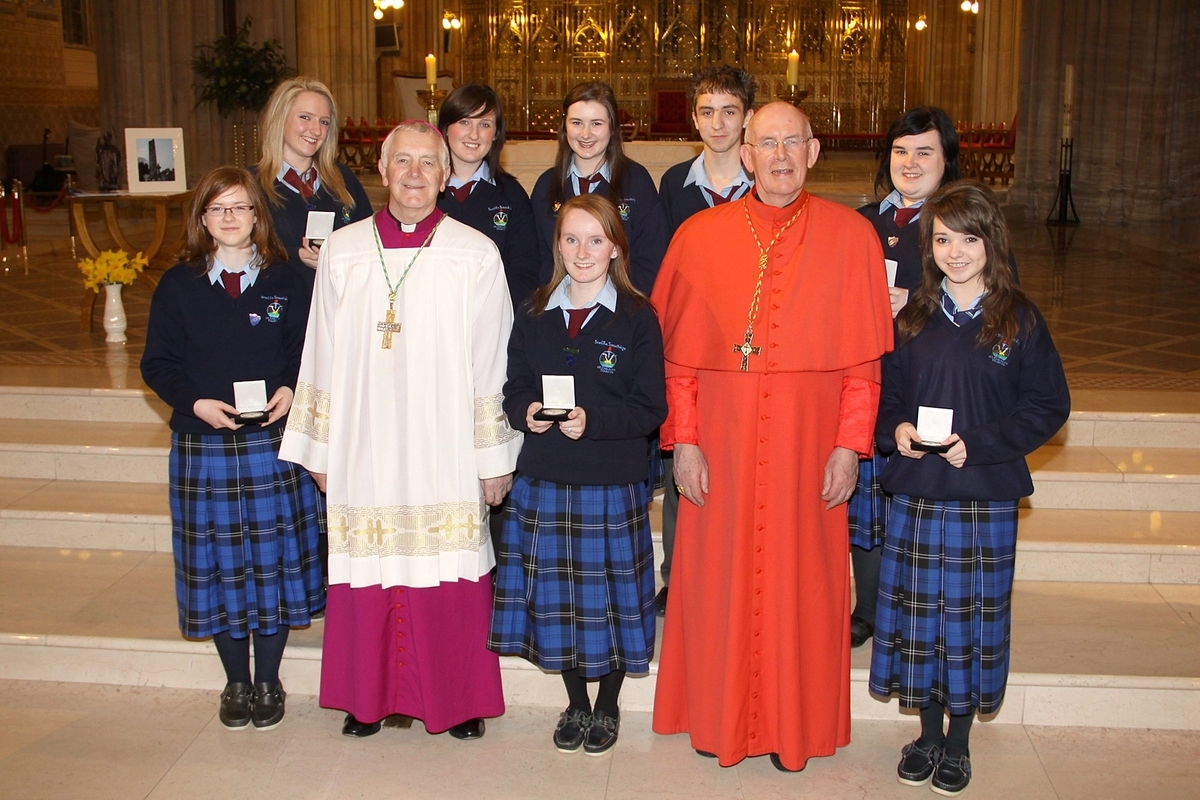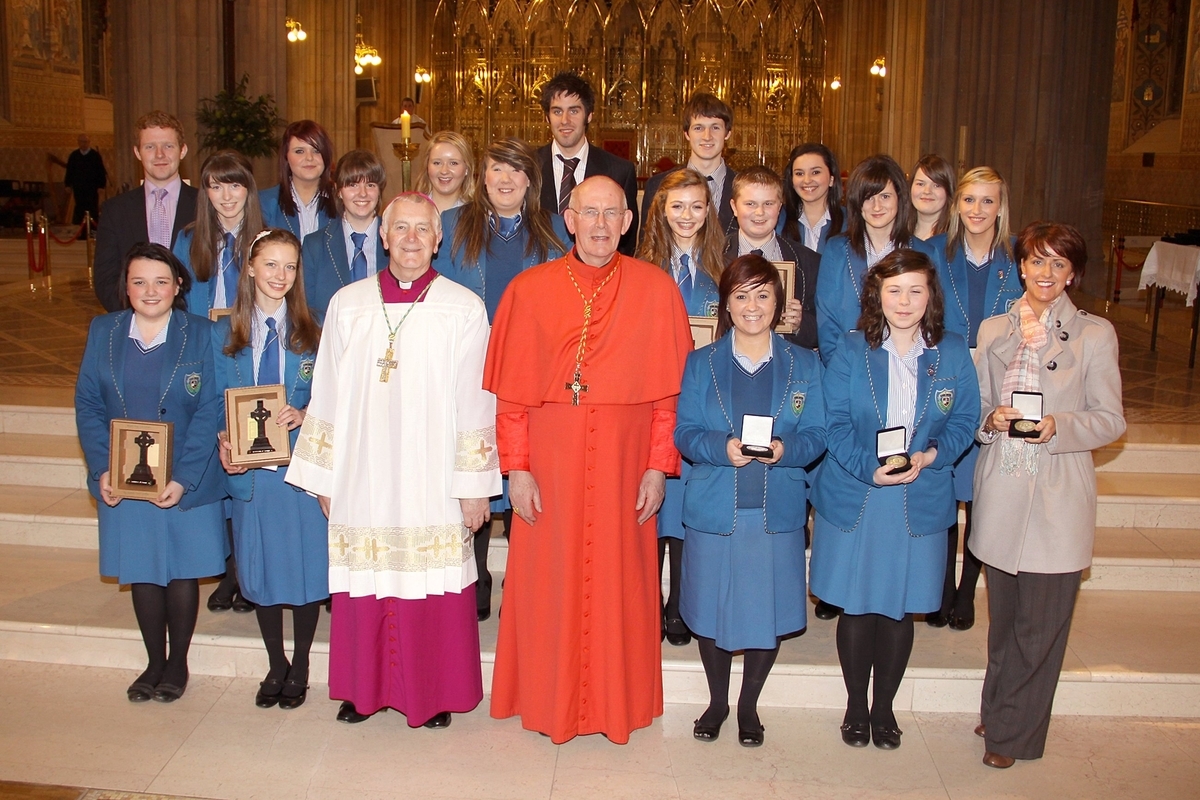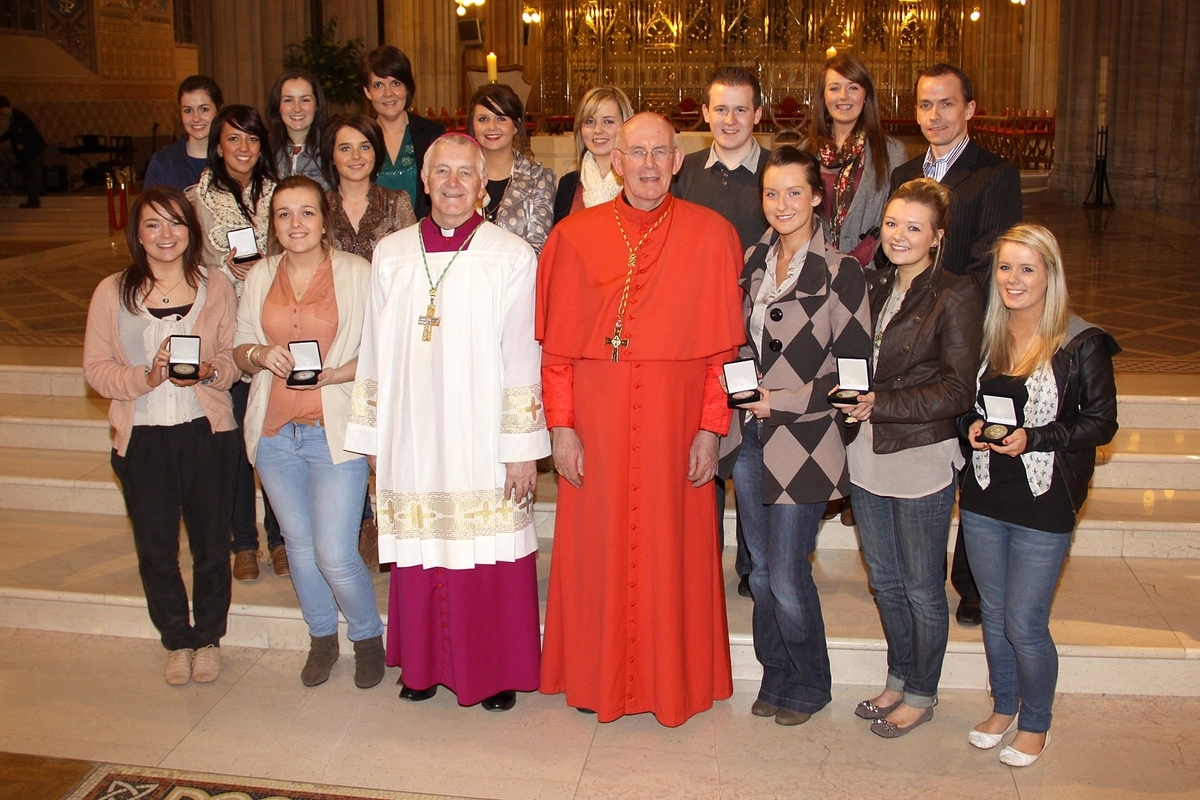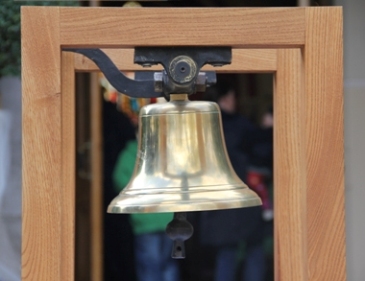HOMILY GIVEN BY
CARDINAL SEÁN BRADY
SUNDAY 6 MARCH 2011
I was in the Intensive Care Unit of Our Lady of Lourdes Hospital, Drogheda yesterday afternoon. I went there to visit Father Jackie Finn – who is critically ill. I stood there for a few minutes in prayer. Then the nurse said: “Well, he is one patient that is certainly well prayed over at this stage”. She was referring to the constant stream of visitors who had come to pray for their Parish Priest. I said to myself: ‘What a blessing that is! I hope that when my time comes – when that day comes – there will be people to come and pray over me in the same way.
It is a very useful exercise in life – to count your blessings at the end of every day – the little blessings and the big blessings. Indeed it is a very healthy thing to count on blessings in life.
For the Jews the great blessing was the Word of God – the fact that God had revealed his Word to their ancestors. It was the way of indicating to them what God wanted them to do. For the Jews, blessing meant a sharing of life from God. With life came strength and success.
In the First Reading today, Moses calls down a solemn blessing upon the people of Israel. But he also calls down a curse as well. These Orientals are, and were, mighty men to curse. The Israelites are told to keep God’s word constantly in mind ‘Let these word of mine remain in your heart and soul; fasten them on your hand as a sign and on your forehead as a circlet.
Tie them on your arms and wear them on your foreheads as a reminder and to this day some Jews wear them on their foreheads – in small little boxes. Some wear them on their left arms. Inside the boxes they have words from the Bible – on pieces of parchment. Precious words – God’s words – words like: ‘Listen Israel Yahweh, our God is the one, the only Yahweh. You must love Yahweh with all your heart, with all your soul, with all your strength.
They did it because of what Moses had to say in the First Reading. He told them to be keepers of the Word. Their whole life was to be built on the Word. He told them loud and clear – they had a choice – between a blessing and a curse. If they obeyed the commandments, they would be blessed. If they chose to disobey then they would be cursed.
It was as plain and as stark as that. Did you ever tie a bit of string around your finger go remind you of something important? Did you ever wear a locket around your neck to keep you closer to someone you love? Jesus was doing the same thing.
The beautiful words remind the people of God’s past scary deeds but they also comfort them, and us, to deepen our own personal friendship with God. It is today – here and now – that we have, with reach, the power to choose friendship with God or alienation from God.
Today and everyday, each one of us makes choices. In the concrete decisions we make in relation to God, we choose a blessing, if we obey; a curse if we choose to disobey.
Jesus in the Gospel wants to impress upon his listeners the importance of solid foundations, Jesus came on earth to carry out the plans of the greatest architect of all- God our Father. God our Father desires all men and women to be saved. God wants us all to come to the Knowledge of the Truth. God’s commandment is that we should love one another. We are to love one another as Jesus loved us.
This commandment sums up all the others. It expresses God’s will for us. That is why Jesus told his disciples:
“It is not those who say
“Lord, Lord”, and do nothing – who will enter the Kingdom of Heaven
But the person who does the Will of the Father in Heaven”.
Sometimes it can be hard to know exactly what God wants us to do.
I once knew a man called Andy Devane. He was one of Ireland’s outstanding architects but he gave it all up and went off to India. There he helped Mother Teresa look after the poor in Calcutta. Then Andy came to Rome to study theology and to pray. There I got to know him well. He was a man whom I admired greatly. Talking about his own work he said that the people he most admired were the builders. The architect draws the plans – puts them on paper – but there comes a stage where he had to explain them to the builders. Then it is over to them to move in and prepare the site and lay down the foundations and proceed to put the building in place – brick by brick, slate by slate. Those are the people – Andy used to say – ‘that I take my off to’.
I suspect Jesus must have watched houses being built – working alongside Joseph – the carpenter. Maybe he took part in building houses. He would have seen that some builders put down solid foundations – built on rock. Others may have taken short cuts with disastrous consequences of course.
Rock is the most solid of all. If you ever go down to Dundalk or Dublin you pass through Father O’Dwyer’s and Father Burn’s County Louth. But before you get there you pass Newry and the new road built at Cloghogue – not only built on rock but cut through rock. That road will not collapse – no matter what floods or tremors or earthquakes may come.
Sometimes we may know exactly what God wants us to do and still find it very difficult to do. That is why I am glad to be here today – to bless your new Community Centre. I am sure that it will be used for many good purposes. I hope it will be used for small groups to sit down together to study the Word of God. If they do so they will get to know more clearly what God wants them to do in any given situation.
That is something really important for all of us. For in Christ, and through him, the will of the Father has been perfectly carried out once and for all. Jesus said on coming into the world: “Behold, I come to do your will, O God”. Only Jesus can say: “I always do what is pleasing to Him”. In the agony in the Garden of Gethsemane – Jesus foresaw the terrible suffering and death they lay ahead. His natural reaction was to shudder and to back off and to pray “Father, if it is possible – let this chalice of suffering pass me by”. But then he remembered the rock on which his whole life on earth was built – ‘Not my will but thine will be done’.
Some of you may have heard a wonderful programme on BBC four this morning called Something Understood. It was about Abraham – the Father in Faith of Jews, Muslims and Christians.
Called by God to leave his homeland, he did so. Called by God to sacrifice his son Isaac – he was ready to do so but eventually did not have to do so. Abraham is a model of trust – trust in a wisdom and power greater than our own.
Today’s Gospel gives us the end of the Sermon on the Mount – we have been listening to it over the last few Sundays. It is the heart of the Good News, brought by Jesus Christ. It began with the recipe for true happiness – a series of eight beatitudes beginning with – Happy are those who know – they are spiritually poor’. St Matthew ends his account of that great sermon with a challenge and a warning:
Anyone who hears these words of mind and obeys them is like a wise man who built his house on rock but anyone who does not obey is like a foolish man who built his house on sand – and it fell, and what a terrible fall that was!
I hope that the new Community Centre will prove to be a great blessing to this parish. I hope that it will help to build up and further enhance the great community spirit that already exists here.
Next year Dublin will be the venue for the World International Eucharistic Congress. It has as its theme In Communion with Christ and with each other. You see there are many forms of communion which are important in life but they all find their source in Holy Communion.
We are called to listen to the words of Jesus and act upon them.
• Words alone are not enough
• Good intentions are not enough
• It is said that the roads to hell are paved with good intentions.
There was once an old cobbler in our part of the country. When he put new soles and heels on shoes – he sometimes got paid in different ways and sometimes he did not get paid at all. To those who gave him only words of thanks – he used to say “Throw it there in there with the rest of them”. Yes, words of thanks are always important but oft times they are not enough. The wise hear the words of Jesus and act upon them. Those who DO the will of Our Father in heaven will actually enter the Kingdom of Heaven.
Our Father, who art in Heaven,
Hallowed by thy name.
Thy kingdom com
Thy will be done on earth as it is in Heaven
AMEN



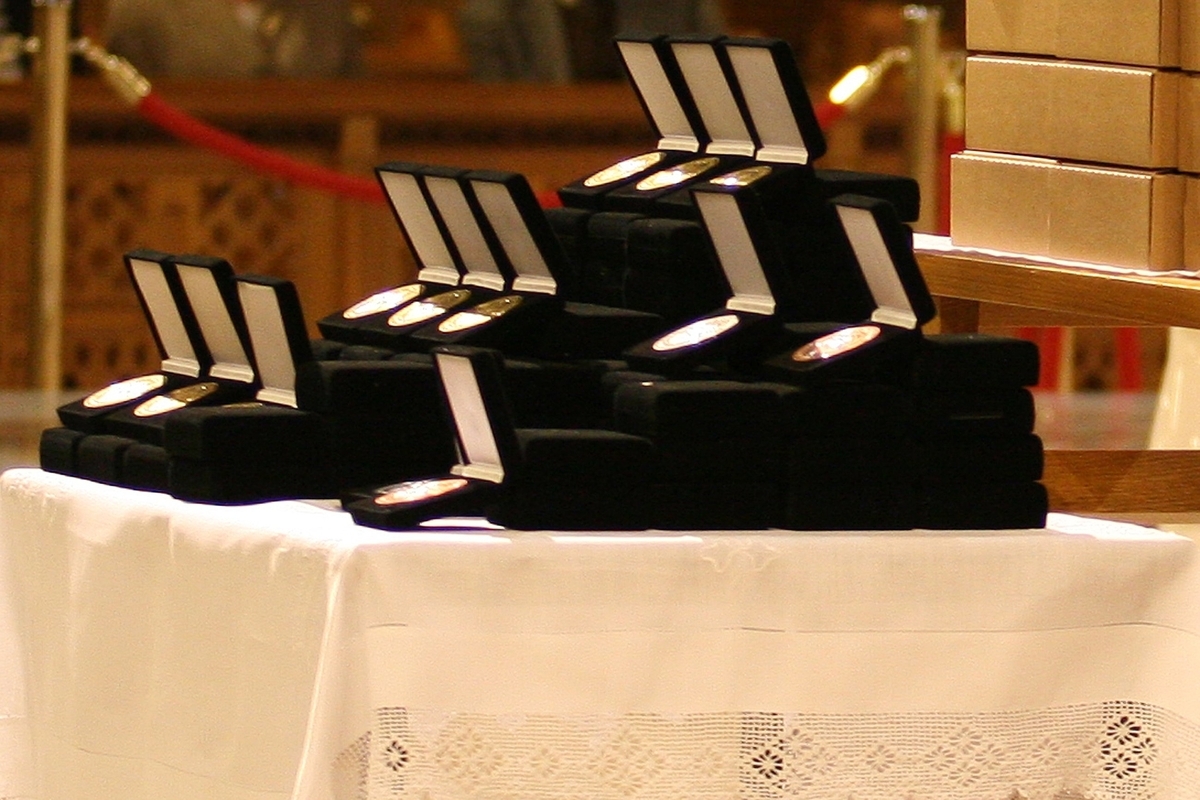
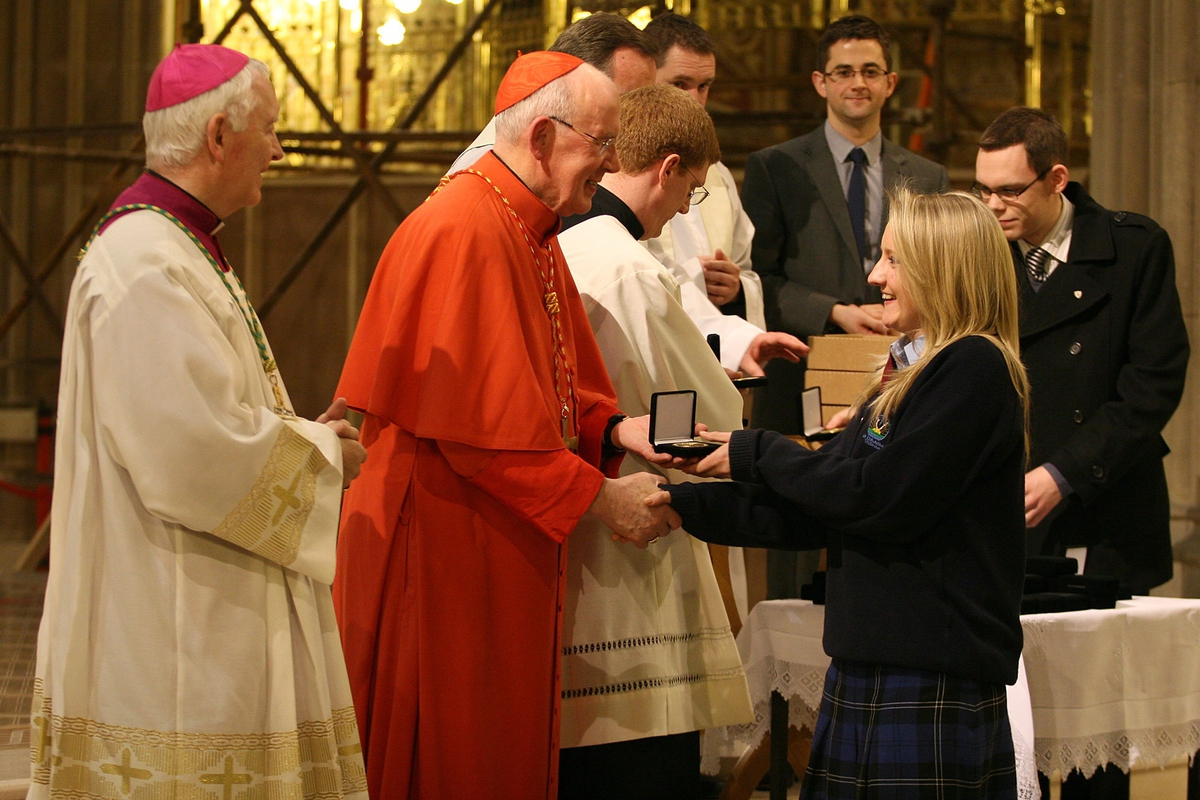 had a great connection with young people and visions to encourage their beliefs. The Award was launched by Diocese of Derry in November 2006. And has been rolled out over various dioceses in Ireland ever since. If you are aged between 16 and 18 and living or going to school in the Archdiocese of Armagh, this award will enable you to become more actively involved in the life of your parish and community.
had a great connection with young people and visions to encourage their beliefs. The Award was launched by Diocese of Derry in November 2006. And has been rolled out over various dioceses in Ireland ever since. If you are aged between 16 and 18 and living or going to school in the Archdiocese of Armagh, this award will enable you to become more actively involved in the life of your parish and community.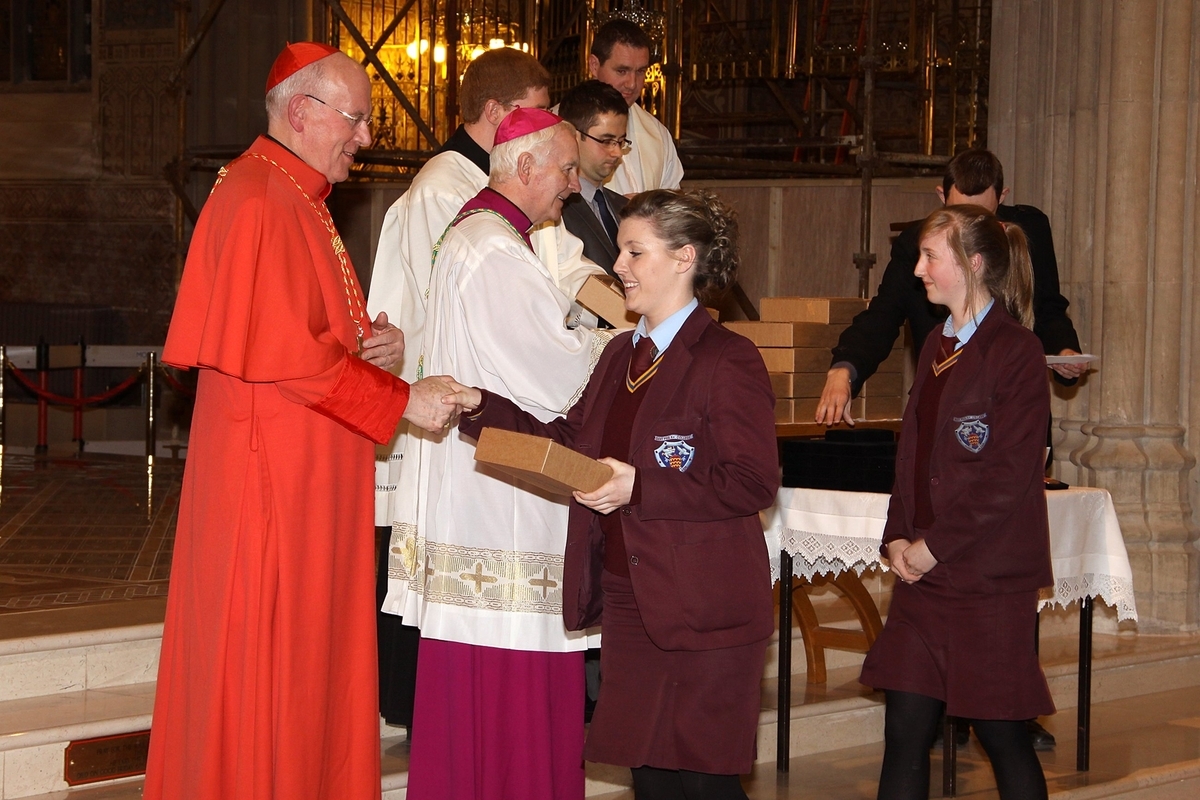 The Muiredach Cross Award was set up by the Archdiocese of Armagh in 2009 and is aimed at young people aged of 14 to 16. Its primary aim is to create opportunities for our young people to put their faith into action. This award may be taken as part of your school’s extracurricular programme and will include a project in your local parish.
The Muiredach Cross Award was set up by the Archdiocese of Armagh in 2009 and is aimed at young people aged of 14 to 16. Its primary aim is to create opportunities for our young people to put their faith into action. This award may be taken as part of your school’s extracurricular programme and will include a project in your local parish. 